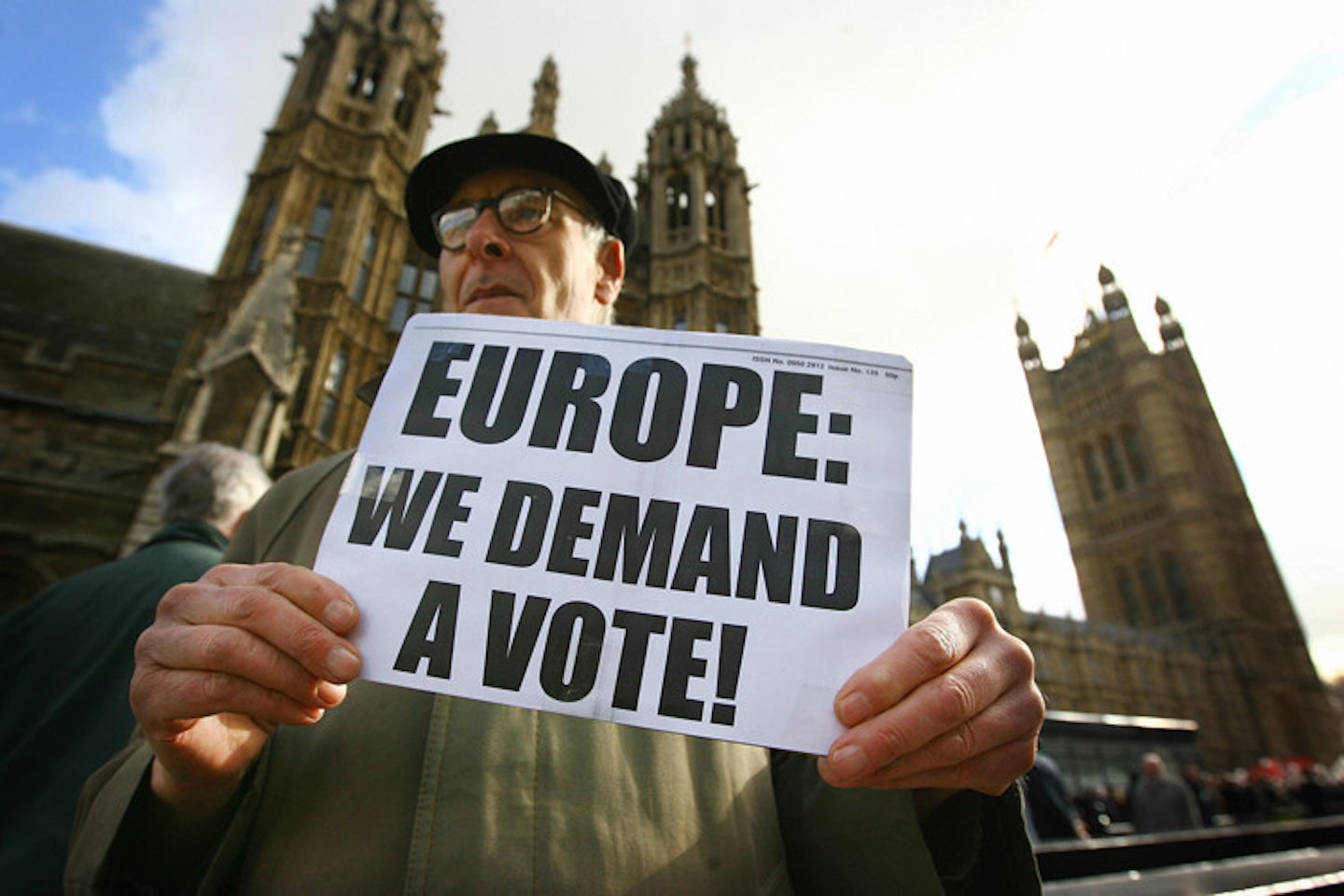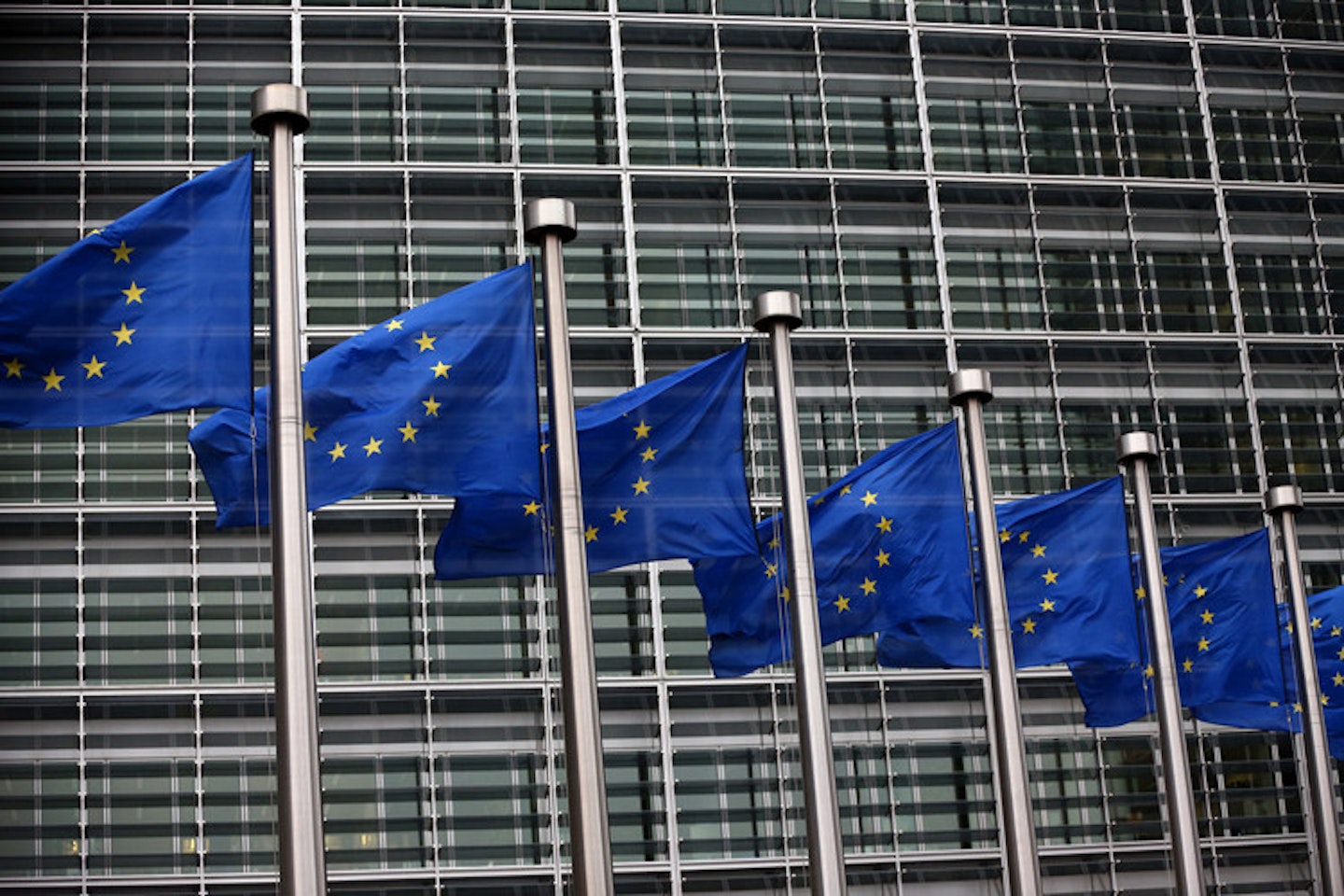What do you think of when you hear the word ‘Europe’? One the one hand, there are cheap beach holidays, years abroad, a weekend in Paris, short queues on arrival at customs, one day being able to buy a second home in the south of France (we can but dream)? On the other, there’s a migration crisis, a refugee crisis and every day there’s another headline telling you how broken it all is.
Ok, what about ‘EU referendum’? It's likely the first thing that springs to mind is Nigel Farage going on about ‘protecting our borders’ - pint in one hand, fag in the other. It might also conjure up David Cameron saying how ‘pumped up’ he is about staying in. Not exactly inspiring stuff.
But the debate about whether we should stay, or go when it comes to the European Union is very real. And, if you'd rather not leave this pretty important decision to Mr Farage and Mr Cameron, here's what you need to know to cast your vote.
When Will The Vote On Staing Or Leaving Europe Be?

We still don't know the date of the referendum, but it's likely it'll be June 23rd ...
So maybe don't book yourself a weekend break across the channel that week – or, do, if you want to show your dedication to the EU by voting with your feet (and sunnies).
The question will be whether the UK should remain a member of the European Union or leave it. We've been a member since 1973 and we voted to remain in just two years after joining in 1975, by a margin of 67% to 33%. There hasn't been another vote on it since then.
Every British, Irish and Commonwealth person over 18 and living in the UK gets a vote - including people living in Gibraltar, unlike in the general election which they don’t get a say in. A plan to allow 16 and 17 year olds the right to vote was defeated - despite them being allowed their say in the Scottish referendum.
David Cameron announced he would hold a referendum after pressure from the Conservatives, who have been split over whether being in the European Union is a good idea for years and years. He promised them he'd have a vote if he won the general election last May and guess what, it happened! And that’s the thing about promises, you have to keep them. Many think the PM didn't expect to win and doesn't actually want the hassle of all this haggling over the Europe but hey, we're here now.
But here's the kicker - nobody can tell us what the country would look like in either scenario – should we stay or go. Yes, really. Nobody really knows. Ask David Cameron and he'll tell you it's just better to be in, ask Mr Farage and he'll say the same about leaving - so how do you decide? And why should you care?
Why Should We Stay In Europe?
The In campaign want people to remember all the good things about being a member of the 28-state bloc - like being able to get cheap flights for a weekend away in Berlin and not having to join the really long 'other passports' queue at the border - while at the same time admitting that not everything is perfect. Their chairman Stuart Rose calls himself sceptical about the UK's close ties to its neighbours across the channel but thinks, overall, we're better off being inside the club than outside it with little control over what’s happening. Even if that means we have to suck it up when the EU slaps us with a silly rule about health and safety or fishing quotas.
One of those who want to stay’s core arguments is that Britain does pretty well out of selling things to countries like France, Germany and Italy and that it would be harder for us to make money if we weren't a member, because we'd have to cough up more cash to the EU to sell our stuff there.
They also think that migration from the EU - the hot topic in this debate and pretty much every headline at the moment - is actually good for us because workers from Europe generally come to Britain to do the jobs we're not keen on doing ourselves; like working in supermarkets, factories and on farms. They also point out that leaving could put an end to those summer ‘work placements’ in Paris or Florence, or a year out spent living (clubbing) in Berlin, because British citizens would no longer be able to up sticks to live and work in the EU so easily if we shut ourselves off from the rest of the group.
And, they think that while it would be nice to have a bit more control over who comes in and out of the UK and who gets access to benefits, we're actually doing pretty well out of the agreement and we don't want people to think Britain is shutting up shop, so why rock the boat?
Why Should We Leave Europe?
On the flip side ...the Leave campaign (aka the outers, yes, this is basically a tale of inies and outies which has nothing to do with belly buttons), have pretty strong ideas about why we're losing out by being in the European Union. A lot of it goes back to historical arguments about who gets to make the laws in the UK - the kind of thing you won't remember unless you were around to vote in the first referendum in the 1970's (yes, we've been here before...). Last time we voted to join the EU, but sceptics say we didn't actually get what we signed up for and now they want to leave - a bit like getting a refund but after a really long trial period. They think we've all got a bit too close for comfort and they'd like Britain to have more power over itself again.
The outers think migration from the EU is damaging because we can't control it ourselves. And that's true - David Cameron has no say over who can come and live in Britain as long as they're from another EU member state – it’s called free movement of people and is the number one bug bear of people who want us to leave. It's also the number one yes-yes for other EU states, who like the idea that their citizens can work wherever they want to (just like you could, in theory, if you decided to move to Italy, Germany, France, Spain etc. tomorrow).
Anti-EU groups also think being tied to countries like Greece, whose economy is not doing very well at all, puts us is in position where we may have to give cash to poorer nations even though we're not exactly living the dream ourselves over here at the minute. They don't think that's fair. And they want us to be able to make all our own laws - which we can't do at the minute because lots of things are agreed by all 28 states inside the EU, and we are required to stick to them.
Is There A Middle Ground On This Whole EU Thing?

So is there a handy middle option? Well yes, sort of. But again it depends on who you want to believe. The prime minister held his hands up at the start of all this and said things haven't been going as well as we hoped with our mates on the continent. He basically sat down with some of the other EU leaders and had ‘the chat’ but instead of telling them ‘it's not you, it's me’ he pretty much said exactly the opposite...which went down much as you'd imagine….
Cameron’s not too chuffed that people from poorer nations, who don't get benefits in their own country, can come to the UK and claim using our system without much hassle. He's also got an issue with the fact that the EU can be slow and a bit old school - it's not got a great reputation when it comes to wooing states like America and India where there are lots of opportunities to sell our stuff. And the PM wants the UK to be able to hold up a red card when it doesn't like things about the EU, to stop new rules being applied to us before they become binding.
Finally, he wants to protect the good old British pound and make sure that all the other states know - as if it wasn't obvious already - that we're a reluctant member of the club and we don't want to use the Euro - ever - or get even closer than we are now. We like our space.
The question is, can he get all the other states to agree to a relationship on his new terms? To let us stay inside the EU, but with a much better deal? And, then, can he convince the British people that things can be rosy in the future?
Like all good relationships, that depends a lot on how much we trust Mr Cameron and whether we think he can actually deliver the changes he's promising. Lots of people are on the fence, while a good chunk of the country has already decided it would be better for us to leave – regardless of what he says.
And like deciding whether your other half is really the one for you or not, nobody can tell you what’s right or wrong. So come on, Dave, we're all ears.
Kate is Senior Political Correspondent at The Telegraph
You might also be interested in:
After The New Hampshire Primary, Could Donald Trump Actually Become President?
The Women's Equality Party's Policies: Here's Your Need To Know
Follow Kate on Twitter @KateEMcCann
This article originally appeared on The Debrief.
